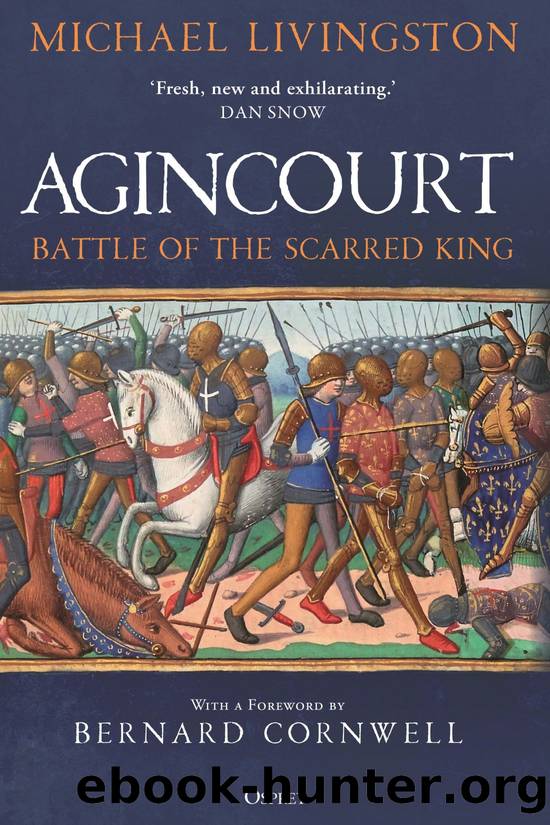Agincourt by Michael Livingston

Author:Michael Livingston
Language: eng
Format: epub
ISBN: 9781472855190
Publisher: Bloomsbury Publishing
Published: 2023-06-27T00:00:00+00:00
all-source analysis and the reconstruction toolkit
Agincourt happened. It was an occurrence at a historical place and time. Lacking omniscience, however, we cannot recover the fullness of any dataset about it. This is the basic tragedy of writing history. We begin from a position of loss, and while we may endeavour to fill the gap between ourselves and the Truth (with a capital âTâ), we can never close it. Our work will be, intrinsically and inevitably, deficient. As we aim to minimize that deficiency, we can and should reach for anything and everything we can.
There is a lot we can reach for. Any event in question, occurring at a historical place and time, was subjected to â was connected to â the entire range of natural phenomena, to say nothing of the internal and external human forces at play. So one of the first things we have to wrap our heads around is that the departmental silos of modern academia have little to no bearing at all on the reconstitution of past events.
Geological and hydrological forces determined the landscape.6 Psychological forces determined the mindset. Meteorological forces determined the weather. Sociological forces determined the sides. Narratological forces determined the memorialization of events. And on and on.
True, some of these fields of knowledge may play a lesser or greater part depending on the event. Some might also be irrecoverable. But they were, in the past moment, all present and all associated.
As a result, whenever we approach a conflict, we should try to access every strand of data that we can, whether familiar or unfamiliar. In my methodology, I borrow from the three-letter agencies of the United States government, who call this kind of intelligence gathering âAll-Source Analysisâ.7
There are literary sources and (rare but exciting) material sources. There are the contextual probabilities of the history of warfare as we understand it. There are secondary sources of experimental archaeology and strategic and tactical modelling, as well as local lore and place-names. At this stage of the game, we must aim to bring every related scrap possible into a single targeting package.
Sometimes it will not be much. If we are very lucky, however, we will find ourselves sifting through a large amount of data. This is the case with Agincourt, which has had a modern army of scholars combing through archives and other resources in search of anything and everything that references the battle. Their hard work has made reams of data available to researchers.
Luckily for us, we stand at an enviable moment in the making of history. Digitized catalogues, combined with networked algorithms, enable the search of thousands of books in seconds. Satellites and the extraordinary technologies that they enable allow us to spy the ancient marks of roads and buildings that would otherwise lie hidden. Email and virtual communication technologies allow us to connect in real time with our fellow researchers around the world.
Sir Isaac Newton talked of seeing further than others because he stood on the shoulders of giants â he relied on the work that had come before him.
Download
This site does not store any files on its server. We only index and link to content provided by other sites. Please contact the content providers to delete copyright contents if any and email us, we'll remove relevant links or contents immediately.
| Belgium | France |
| Germany | Great Britain |
| Greenland | Italy |
| Netherlands | Romania |
| Scandinavia |
Room 212 by Kate Stewart(4113)
The Crown by Robert Lacey(4113)
Endurance: Shackleton's Incredible Voyage by Alfred Lansing(3853)
The Iron Duke by The Iron Duke(3650)
The Rape of Nanking by Iris Chang(3525)
Killing England by Bill O'Reilly(3460)
Joan of Arc by Mary Gordon(3268)
Say Nothing by Patrick Radden Keefe(3068)
I'll Give You the Sun by Jandy Nelson(2845)
Hitler's Monsters by Eric Kurlander(2736)
Shadow of Night by Deborah Harkness(2725)
Margaret Thatcher: The Autobiography by Thatcher Margaret(2688)
Mary, Queen of Scots, and the Murder of Lord Darnley by Alison Weir(2680)
Darkest Hour by Anthony McCarten(2650)
Blood and Sand by Alex Von Tunzelmann(2611)
Red Famine: Stalin's War on Ukraine by Anne Applebaum(2468)
Eleanor & Park by Rainbow Rowell(2398)
The One Memory of Flora Banks by Emily Barr(2350)
Book of Life by Deborah Harkness(2269)
